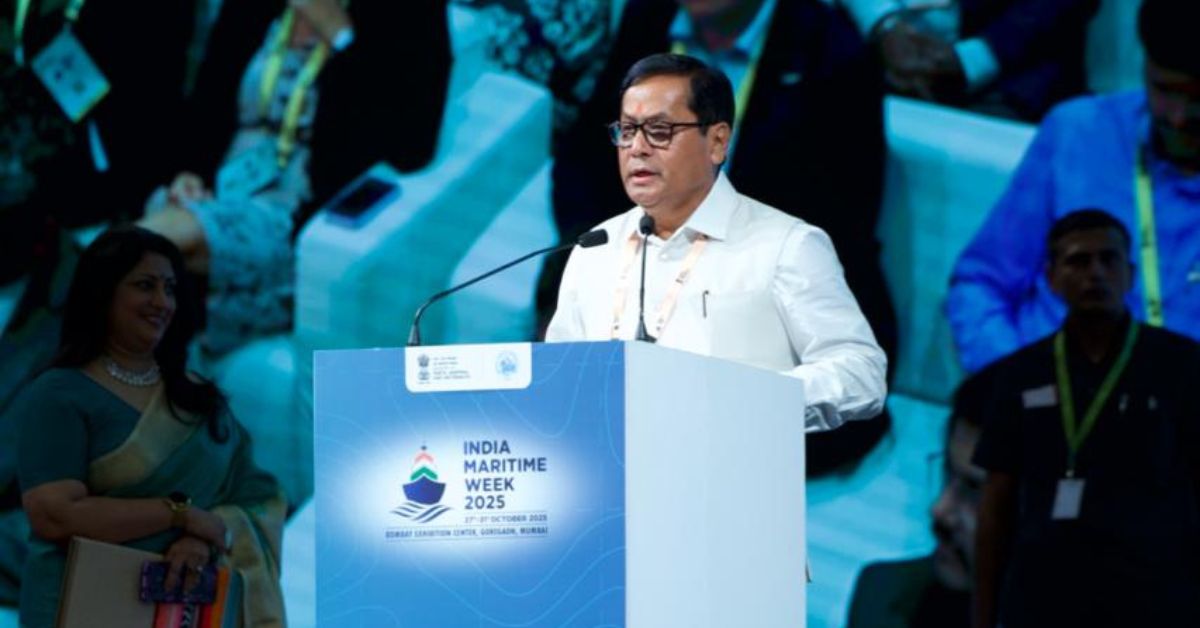India is fast-tracking its transition toward clean maritime energy by transforming major ports into centres for green hydrogen production, bunkering, and export, Union Minister for Ports, Shipping and Waterways Sarbananda Sonowal announced on Tuesday during India Maritime Week (IMW) 2025 in Mumbai.
“Across the country, over 12 million tonnes of green hydrogen-based e-fuel capacity has already been announced. With India’s strategic location along key global trade routes, our ports are evolving into hubs for green hydrogen and green shipping corridors that will connect domestic and international markets through clean energy trade,” Sonowal said.
Highlighting the government’s broader maritime reform, the minister noted that India has approved an ₹69,725 crore ($8 billion) investment package to revitalise shipbuilding and strengthen the maritime ecosystem — a move that will “lay the foundation for a golden era” and help India emerge among the top five maritime nations by 2047.
To further bolster green growth, the government has committed ₹19,989 crore in budgetary support for the Shipbuilding Development Scheme (FY26–FY36). Financing support will come from Sagarmala Finance Corporation Ltd, India’s first maritime-focused NBFC, and a ₹25,000 crore Maritime Development Fund, designed to drive sustainability and infrastructure investments across ports.
Speaking at the same session, Vijay Kumar, Secretary, MoPSW, said India is rapidly becoming a major player in the global green hydrogen economy. He noted that Solar Energy Corporation of India (SECI) tenders have pushed production costs to as low as $571 per tonne of green ammonia, among the most competitive globally. “Several countries represented at IMW 2025 have expressed interest in importing green fuels from India. We are moving toward becoming a global supplier of green hydrogen,” Kumar added.
He outlined a detailed roadmap for green transition in the maritime sector, under which 60% of power consumption at major ports will come from renewables by 2030. Ports have been directed to electrify over 50% of their vessels, vehicles, and equipment by 2030, rising to 90% by 2047, alongside energy efficiency and green building mandates for all new infrastructure.
Sonowal reaffirmed that these initiatives align with India’s Net Zero 2070 commitment, targeting a 30% reduction in carbon emissions per tonne of cargo by 2030 and 70% by 2047. “Flagship initiatives such as Sagarmala, Maritime Vision 2030, Harit Sagar Guidelines, and Maritime Amrit Kaal Vision 2047 are leading this transformation,” he said.
The event also saw a flurry of investment announcements, led by Adani Ports and Special Economic Zone (APSEZ), which signed two MoUs worth ₹53,000 crore to develop Vadhavan Port in Maharashtra — ₹26,500 crore for offshore projects and another ₹26,500 crore for container terminal development.
Additionally, APSEZ had earlier committed ₹43,500 crore for expanding Dighi Port, while Indian Railway Finance Corporation (IRFC) pledged ₹20,000 crore in financial support for the Vadhavan project. Global partners are also joining in — Evergreen Marine (Taiwan) signed an MoU worth ₹10,000 crore, and Gulftainer (UAE) committed ₹4,000 crore for terminal development at the port.
Valued at ₹76,220 crore, Vadhavan Port is set to become India’s 13th major and largest container port, capable of handling 298 million metric tonnes (MMT) of cargo annually, including 23.2 million TEUs. Being developed under a public–private partnership (PPP) model in Palghar district, the first phase is targeted for completion by 2029.
With ports turning into green energy export hubs and mega projects like Vadhavan taking shape, India’s maritime sector is entering a transformative decade—one that blends sustainability, technology, and scale to position the nation as a global maritime and clean energy leader.









